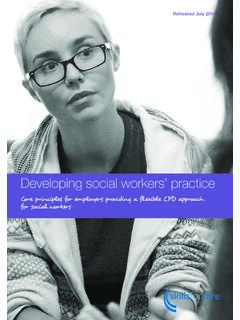Transcription of Principles to practice - good mental health and wellbeing ...
1 Principles to practice The worker's guide to implementing the common core Principles to support good mental health and wellbeing in adult social care Supported by 1. Introduction The care and support needs of people who use social care services can often indicate a heightened risk of poor mental health and wellbeing . Skills for Care estimate that 4 500,000. social care workers have regular contact with people who have a mental health problem. It is important that staff working in social care services know how to support and promote good mental health and overall wellbeing for everyone who uses those services. With this in mind, Skills for Care has published the Common core Principles to support good mental health and wellbeing in adult social care, based on work by the mental health Foundation. The common core Principles and two key areas outlined in this practice Guide offer a comprehensive framework for the social care workforce to provide consistent high quality social care and support which promotes the mental health and wellbeing of people who need care and support.
2 This guide to good practice is based upon real life examples from a range of social care settings, which demonstrate how each of the ten Principles and two key areas can be applied in practice . Who this guide is for The ten Principles and two key areas described in this document were developed with people who use social care services, as well as by practitioners in a range of social care settings. This Principles to practice ' guide can facilitate learning and development for all levels of social care staff within any social care setting to support staff in promoting good mental health and wellbeing for everyone who needs care and support. All names and other identifying features used in the examples have been changed or anonymised. Acknowledgements Skills for Care and the mental health Foundation are grateful for the contributions of the social care service providers and the care staff who participated in focus groups and interviews to offer their examples of best practice .
3 Key contributors: Brent MIND. Barnsley Metropolitan Borough Council, Adults and Communities Workforce Development Unit Rethink Satash Community Care Tees, Esk and Wear Valleys NHS Foundation Trust 2. Principles to practice . The worker's guide to implementing the common core Principles to support good mental health and wellbeing in adult social care Published by Skills for Care, West Gate, 6 Grace Street, Leeds LS1 2RP Skills for Care 2014. Copies of this work may be made for non-commercial distribution to aid social care workforce development. Any other copying requires the permission of Skills for Care. Skills for Care is the employer-led strategic body for workforce development in social care for adults in England. It is part of the sector skills council, Skills for Care and Development. Bibliographic reference data for Harvard-style author/date referencing system: Short reference: Skills for Care [or SfC] 2014. Long reference: Skills for Care, Principles to practice .
4 The worker's guide to implementing the common core Principles to support good mental health and wellbeing in adult social care, (Leeds, 2014). Skills for Care would like to acknowledge the assistance of the mental health Foundation in the development of this work. 3. Principle 1. Know the key signs of mental illnesses and distress and be able to respond appropriately. When someone is behaving out of character, you need to be well-trained to take your time with it and not rush to any sort of conclusion and get any help that may be available. (Brent MIND). You signpost them on to other places where they can try and get help with those things. (Rethink). Summary People who use social care services may experience periods of crisis or distress caused by a mental illness or mental health problems. It is important that you are able to identify if people need adjustments to the care and support they receive. Being able to communicate clearly with people who need care and support is also very important to help understand how someone is feeling and to avoid misunderstandings.
5 Situation Waiting for a bus, you meet someone who is using your service and start up friendly conversation. While talking together, you notice that this man's behaviour and speech seem excitable and erratic. You are aware that this particular man is usually quite calm and that this behaviour is not usual for him. You are concerned about this man going home alone, considering his current mental state. You follow several steps to ensure he feels supported in managing his mental health and wellbeing . This includes: promptly taking some time to listen to why is feeling differently inviting the young man back to the office with you so that you have a quiet space to talk together in more detail about how he's been feeling discussing activities, goals and lifestyle habits that can promote his wellbeing talking to colleagues or your manager about your concerns and the possible need for the person to see his GP or mental health service (if he is in contact with them).
6 4. Dilemma You are supporting a woman in a residential care home who continually cries on some days without an apparent cause or explanation. Some of the other residents seem confused or upset by her emotional behaviour. You and the other care providers understand that this particular woman sometimes likes to express her emotions in this way. What would be the appropriate response in this situation? Would you try to prevent this woman from crying, such as by using means of distraction, or would you provide a private space for her to cry freely? Would you offer her the opportunity to be referred to see her GP for a mental health assessment or support? They did a lot of work around interpersonal relationships and managing emotional distress, relaxation, and she's now come back to live in the community. (Barnsley Metropolitan Borough Council). 5. Principle 2. Understand the importance of good mental health and wellbeing and have good knowledge of how to promote these with people who need care and support I think people are more likely to stop doing things that are detrimental to their mental health and wellbeing because they've been able to be open, they're not being judged.
7 (Rethink). It's about understanding people and understanding where the boundaries lie. You have to acknowledge those feelings but try to encourage that person to do other things as well. (Rethink). Summary mental health is about how all of us think and feel, our outlook on life and how we are able to cope with life's ups and downs. You are in good mental health if you can make the most of your potential, cope well with life and life changes, and play a full part in things like family, workplace and/or community. Some key factors include feeling a sense of autonomy and control, keeping a healthy lifestyle and feeling valued and respected by people around you. Social care workers play a key role in communicating the factors that promote good mental health to enable people to take actions which improve their wellbeing . 6. Situation You are supporting an older woman who has physical disabilities so that she needs support with day-to-day tasks.
8 During your visit, she tells you that she has been feeling particularly low for quite some time. The woman talks about feeling lonely and that no one has visited her in the past month with the exception of your and other staff members' visits. You are aware that isolation and loneliness can have negative effects on mental health and wellbeing so you are keen to ensure that this woman has access to opportunities and lifestyles that promote her wellbeing . taking time to listen empathically to her feelings of loss and offering reassurances for support discussing the possibility of helping her seek more specialist bereavement support looking together at possible outlets for this woman's grief, such as bereavement groups, giving a set time of the day to grieve and finding distraction techniques providing information about telephone and face-to-face services the woman can access if she experiences a crisis or needs immediate support.
9 Dilemma You are supporting an older woman who has physical disabilities so that she needs support with day-to-day tasks. During your visit, she tells you that she has been feeling particularly low for quite some time. The woman talks about feeling lonely and that no one has visited her in the past month with the exception of your and other staff members' visits. You are aware that isolation and loneliness can have negative effects on mental health and wellbeing so you are keen to ensure that this woman has access to opportunities and lifestyles that promote her wellbeing . How could you support this woman in finding activities and lifestyles that are suited to her and which promote her mental health and wellbeing ? Would you support her in researching her options on the internet? Would you offer to return with more information on your next visit? What behaviours might help this woman feel less lonely and improve her wellbeing ? I would try to get some form of monitoring in place which meant a befriender, or a mentor to provide weekly visits.
10 (Brent MIND). 7. Principle 3. Promote dignity and respect by maintaining confidentiality and integrity and valuing the individual's knowledge and experience It's a sort of conversion principle, do as you would be done by and treat people as you would be treated yourself. (Brent MIND). It's always about validation, whether you're talking about somebody with dementia or depression, it's always about validating his feelings and not making him feel he's abnormal or should be pulling himself together'. (ees, Esk and Wear Valleys NHS Foundation Trust). Summary Social care that is guided by dignity and respect will have a positive impact on people's self-esteem, feelings of self-worth and overall mental health and wellbeing . It is important that social care workers show the same level of respect and dignity for people using services that they would want for themselves or for their loved ones. Acknowledging the value of each individual's lived experiences, and accounting for personal needs and preferences, ensures that people being supported by social care services feel valued and respected.













